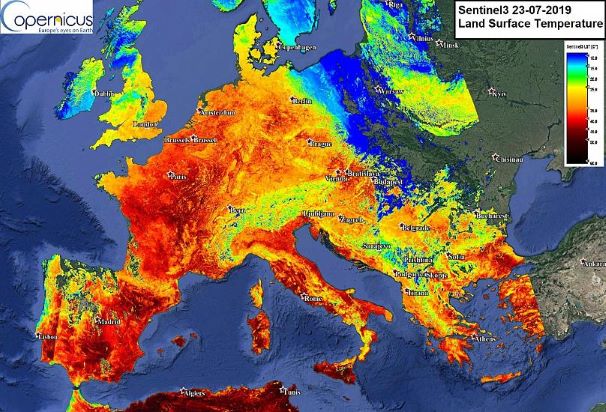Climate Change: Europe Faces the Heat
This month, a group of scientist had predicted that climate change made it five times more likely that Europe would experience a powerful heat wave like the one that baked the region in June.
 Europe facing heatwave Again!
Europe facing heatwave Again!
Europe is gearing up for another extreme heatwave that could set all-time records for several countries in the region.
Another heatwave is set to engulf parts of central and northern Europe later this week, bringing record-breaking temperatures after a similar weather event in June.
The UK’s Met Office said on Monday that the country’s all-time temperature record could be broken by Thursday, surpassing the high of 38.5°C recorded in Kent in August 2003.
Paul Gundersen, the Met Office’s chief meteorologist, said the setup was “broadly similar” to the June heatwave when an area of hot air moving north from the Sahara desert embraced parts of the continent. He added: “As well as high temperatures during the day, overnight temperatures will also be notably warm and could also break records.”
Record-breaking temperatures may also hit France on Thursday — although they are not expected to reach the all-time high of 46°C, which was felt last month.
But forecasters say the latest heatwave could topple Paris’ temperature record of 40.4°C, which was hit in 1947, and could also fall in other cities including Bourges, Lille and Reims.
On Tuesday, Meteo France registered 41.2C in the south-western city, breaking a 2003 record of 40.7C.
France is currently struggling with a drought due to a dry period felt since the last heatwave, which is expected to be further aggravated this week.
In Portugal, more than 1,000 firefighters are battling to control a wildfire in the Castelo Branco region. Authorities said on Tuesday that 90% of the fire in the region had been brought under control, but continued high temperatures could make conditions “very complicated”.
Map from @CopernicusEMS showing current #fire risk in Europe and part of North Africa. Via @AEMET_Esp, where weather conditions mean there is extreme fire risk in a large part of the country. pic.twitter.com/r4Badv2neF
— WMO | OMM (@WMO) July 22, 2019
Copernicus, the European Commission’s emergency management service, released a map on Monday depicting current wildfire risks across Europe, with parts of Spain, Portugal and Italy reaching a “very high danger” alert. Belgium, Germany and Switzerland are also expected to feel the effects of the recent heatwave, and, unlike June, Scandinavian countries will too.
Climate Change Link
This month, a group of scientist had predicted that climate change made it five times more likely that Europe would experience a powerful heat wave like the one that baked the region in June.
The findings, released on July 2 by the World Weather Attribution Network, answer the tricky question of how the heatwave might have been linked to global warming. The extreme weather broke heat records in parts of Germany, Switzerland, Italy, Spain, the Netherlands and the Czech Republic, and set an all-time high for France of 45.9° Celsius.
Heatwaves aren’t just about isolated high temperatures; the events are also defined by where, when and for how long they occur.
To identify heat wave patterns and determine if climate change played a role in the June event, the network’s scientists examined three-day averages of the average daily temperatures for France during the heatwave, and compared those to previous temperature observations as well as to climate simulations to assess the role of climate change.
Current climate conditions made the June heatwave in France up to 100 times more likely to occur than it would have been in 1901, the team found.




